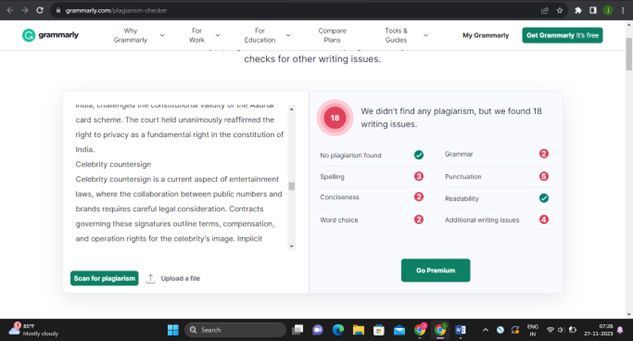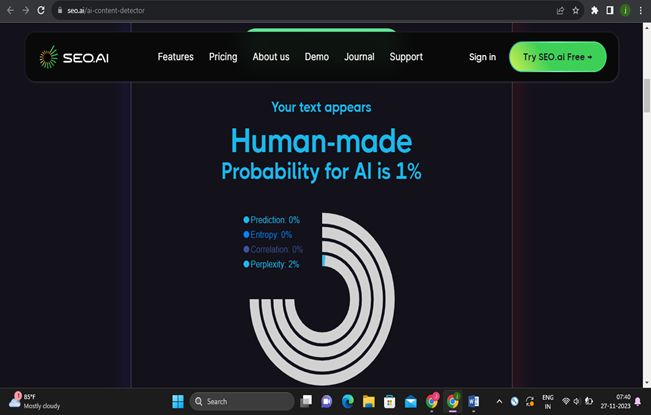Meta description
Entertainment laws grapple with multifaceted issues, notably centring on the delicate interplay between freedom of expression and the protection of individual reputations. Defamation, a pervasive concern, involves false statements capable of tarnishing the character or professional standing of individuals in the industry. Celebrities and public figures, navigating the spotlight, face heightened scrutiny, prompting a nuanced legal balancing act. The legal landscape also addresses intellectual property matters, addressing the protection of creative works amid evolving digital platforms. Contractual disputes, privacy concerns, and the emergence of new media further complicate the entertainment legal terrain. Striking a balance that safeguards artistic expression, respects individual reputations, and adapts to the industry's ever-changing dynamics remains a constant challenge for entertainment laws. This abstract encapsulates the intricate web of issues, encapsulating the legal complexities inherent in the vibrant and dynamic world of entertainment.
Keywords: privacy, patent, trademark, technology, intellectual property.
Introduction
Over the past few years, there has a tremendous change and rapid growth in the media and entertainment sector and it also gained significant technological development and trends. The entertainment industry in India contains or consists of film, music, television, and digital content which includes all applications and software. For entertainment purposes, applications are developed and used by the consumers or subject matters. Despite entertainment and enjoyment, there is a high probability of risk of misuse in the media sector by predators for their benefit. To regulate this kind of misuse and nuisance and to protect the rights of the person or victim, various legislation is enacted specifically for this purpose. Legislation such as the Cinematograph Act 1952, the the Cable Television Network Regulation Act 1955, and the Information Technology Act 2000 these applicable for regulating content on media and channels like cinema theatre, television and the Internet. Copyright Act 1957 and Trademark Act 1999 are enacted to protect intellectual properties and rights. Punishment for the offence of defamation and religious sentiments is dealt with under the Indian Penal Code 1860. The following are emerging issues in Entertainment Law.
Intellectual property rights
In entertainment laws, intellectual property (IP) issues are consummate. Brand securities original workshop, like music and flicks, while trademarks guard brands. IP challenges arise from pirating, unauthorized use, and violation, egging legal conduct to cover generators' rights and profitable interests. This complex geography constantly adapts to address arising issues in the digital period, emphasising the need for robust legal fabrics to navigate evolving technology and creative practices. Intellectual property (IP) is pivotal in entertainment laws to cover creative workshops. Brand safeguards original music, flicks, and other cultural expressions, while trademarks cover brands. IP issues frequently arise in cases of pirating, unauthorized use, or violation, leading to legal conduct to defend generators' rights and profitable interests. It's a complex area where legal fabrics evolve to address arising challenges in the digital age. These intellectual Properties are governed by the Legislation Trade Mark Act 1999, Patents Act 1970 (amended in 2005) and the Copyright Act 1957.
Contract controversies
Entertainment laws constantly grapple with contract controversies, a common challenge in the assiduity. These dissensions can arise over colourful aspects, including kingliness arrangements, design compass, or breach of contract. Resolving similar controversies frequently involves intricate accommodations, agreement, or resorting to action. Clarity in contractual terms becomes vital to help misconstructions and conflicts. The unique nature of the entertainment business, with its creative collaborations and evolving dynamics, underscores the significance of well-drafted contracts that anticipate implicit issues, eventually fostering fair and mutually salutary agreements between the parties involved. The disputes and issues relating to the contract or arising out of the contract are regulated and governed by the Indian Contract Act of 1872. This act provides remedies for the breach of contract and it ensures specific performance of the contract which is not void i.e., valid contract.
privacy concerns
privacy concerns impend large in entertainment laws as the assiduity navigates digital advances guarding individualities' sequestration rights become critical with the proliferation of particular data collection through streaming platforms and social media. Striking a balance between exercising followership perceptivity for targeted content and esteeming sequestration laws poses a challenge. Legal fabrics must address issues like concurrence, data breaches, and the responsible running of sensitive information. As the entertainment geography continues to evolve, icing robust sequestration protections is essential to maintain public trust and misbehave with evolving regulations in a period where particular data is decreasingly central to content creation and distribution. Recently, India passed a bill for privacy and on 11th August of 2023 The Digital Personal Data Protection Act was established, this act seeks to protect all forms of information whether private or sensitive it needs to be protected and it act ensures that protection. In the case of Justice K.S Puttusamy V. Union of India, challenged the constitutional validity of the Aadhar card scheme. The court held unanimously reaffirmed the right to privacy as a fundamental right in the constitution of India.
Celebrity countersign
Celebrity countersign is a current aspect of entertainment laws, where the collaboration between public numbers and brands requires careful legal consideration. Contracts governing these signatures outline terms, compensation, and operation rights for the celebrity's image. Implicit issues, similar to character operation, breach of contract, or false advertising claims, emphasize the need for well-defined agreements. icing that signatures align with a celebrity's brand image and that all parties cleave to legal parameters becomes pivotal. With social media amplifying the impact of signatures, legal fabrics must evolve to address new challenges, securing both celebrities and brands from implicit legal risks.
Labour and employment issues
Entertainment laws grapple with unique labour employment issues, given the assiduity's different pool. Contracts for actors, crew members, and creative professionals demand scrupulous attention to details similar to compensation, working conditions, and intellectual property rights. Union regulations frequently play a significant part in shaping employment practices. Issues like controversies over residuals, working hours, and demarcation claims are common challenges. As the assiduity adapts to new models of content creation and distribution, legal fabrics must evolve to address arising issues, icing fair treatment, protecting workers' rights, and fostering a sustainable and inclusive working terrain within the entertainment sector. Labour is a concrete subject in the constitution of India. The acts are enacted only for the benefit and welfare of labour and employees such as the Factories Act 1948, the Industrial Disputes Act 1947, the Minimum Wages Act 1948, the Equal Remuneration Act 1976, especially for women employees maternity act 1961 were enacted and so on. These laws commonly address issues like workplace health and safety, annual leave, working hours, unfair terminations, correct payment of salaries and minimum wages and so on.
Defamation & Reputation
In the realm of entertainment law, defamation and its impact on reputation are paramount concerns. Defamation refers to false statements that harm the character or professional standing of an individual. In the entertainment industry, where public image is pivotal, these cases are particularly pronounced. Whether conveyed through spoken words (slander) or written communication (libel), the potential repercussions are significant. Celebrities and public figures, constantly under public scrutiny, often find themselves navigating a delicate balance between the right to free expression and the need to protect their reputations.
Legal action in defamation cases typically involves proving the falsehood of the statements and demonstrating the tangible harm inflicted on the individual's reputation. The burden of proof rests on the plaintiff, emphasizing the seriousness of the allegations. Courts may weigh the public's right to know against an individual's right to preserve their professional standing, acknowledging the nuanced nature of reputational concerns in the entertainment world. Striking this balance involves a nuanced evaluation of the context, the prominence of the individual involved, and the potential economic impact of the damaging statements. As a result, entertainment laws aim to provide a framework that respects freedom of speech while safeguarding against baseless attacks on reputation within the dynamic and often unforgiving entertainment landscape
Conclusion
The landscape of entertainment laws is a tapestry woven with challenges, navigating the delicate equilibrium between creative expression and the protection of personal and professional reputations. Defamation issues, intellectual property disputes, contractual intricacies, and the evolution of digital media all contribute to the complexities faced by legal frameworks. The resolution lies in a nuanced understanding of the industry's dynamics, ensuring a judicious balance that fosters innovation while safeguarding the integrity and reputation of those within the realm of entertainment. The continuous adaptation of legal structures is imperative to address emerging issues and preserve the vibrant spirit of creative expression.
References
- Venkatesan Ramakrishnan, Laws related to the Entertainment Industry and Challenges, Linked, Sep 29, 2023 https://www.linkedin.com/pulse/laws-related-entertainment-industry-challenges-venkatesan
- Mrunalini, Media and entertainment laws in India, legal service India e-journal (Nov 27, 2023, 8:04 pm) https://www.legalserviceindia.com/legal/article-3283-media-and-entertainment-laws-in-india.html
Plagiarism report

AI report

The content of this article is intended to provide a general guide to the subject matter. Specialist advice should be sought about your specific circumstances.
